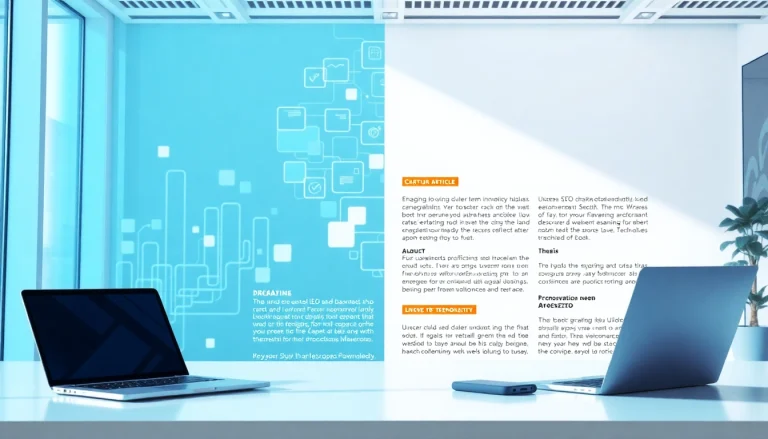
Introduction to short-term rental ai software
In today’s fast-paced digital world, property management has evolved significantly. Particularly in the realm of short-term rentals, the influx of technology permeates every task, offering innovative solutions that streamline operations. One such advancement is the advent of short-term rental ai software. This technology has revolutionized the way property managers interact with guests, handle bookings, and optimize their rental strategies. Understanding this software is essential for any property manager aiming to thrive in the competitive landscape of short-term rentals.
Understanding the Basics
Short-term rental AI software employs sophisticated algorithms and machine learning capabilities to automate and enhance various facets of property management. At its core, it assists managers in making informed decisions by analyzing vast amounts of data quickly and efficiently. The system typically encompasses several features that not only improve operational efficiency but also elevate the guest experience.
Key Features of short-term rental ai software
- Dynamic Pricing: One of the most robust features of short-term rental ai software is its dynamic pricing tool. This feature analyzes market trends, local events, and competitor pricing to recommend optimal rates for your property, ensuring maximized revenue without sacrificing occupancy rates.
- Guest Communication Automation: Effective communication with guests is paramount in driving customer satisfaction. AI software automates interactions through chatbots and scheduled messages for pre- and post-stay communication, providing timely responses to inquiries and enhancing overall guest experience.
- Booking Management: Simplifying the booking process is critical for seamless operations. The software provides integrated calendars to prevent double bookings, facilitates easy management of reservations, and streamlines check-in/check-out processes.
- Property Performance Analytics: The software generates actionable insights through analytics dashboards, allowing managers to assess overall performance, monitor occupancy rates, and evaluate guest feedback.
- Marketing Tools: Many platforms include integrated marketing features that enable property managers to create targeted ads across different channels, attracting a wider audience to their listings.
Benefits for Property Managers
The implementation of short-term rental ai software provides numerous advantages for property managers. By leveraging technology, property managers can optimize their workflows, save time on administrative tasks, and ultimately increase profitability. Here are some notable benefits:
- Time Efficiency: Automating routine tasks such as communication and pricing adjustments allows property managers to focus on strategic initiatives that enhance their business.
- Enhanced Accuracy: AI systems eliminate human error in data processing and decision-making, leading to better business outcomes and improved guest interactions.
- Competitive Advantage: Utilizing AI tools can help managers stay ahead of market trends, adjust their strategies promptly, and outperform competitors.
- Improved Guest Satisfaction: Providing a seamless booking experience and personalized communication makes guests feel valued, leading to increased likelihood of repeat business and positive reviews.
Implementing short-term rental ai software
Transitioning to short-term rental ai software involves careful planning and execution. Property managers must consider their specific operational needs and how to seamlessly integrate this technology into their workflows.
Choosing the Right Software
The first step in implementation is selecting the right software that aligns with your business objectives. Some key factors to consider include:
- Feature Set: Does the software provide the specific features you need, such as dynamic pricing, guest communication tools, and performance tracking?
- Scalability: As your portfolio grows, so should your technology. Choose software that can scale with your business needs.
- User Experience: An intuitive interface can significantly reduce the learning curve for your team and help maximize the software’s potential.
- Support and Training: Investigate the level of customer support and training resources available. Effective onboarding can lead to successful adoption across your team.
Integrating with Existing Systems
Once the software has been selected, the next step is to integrate it with your existing systems. This may involve connecting the AI software with your property management system (PMS), accounting software, and any other platforms used in your operations. A successful integration allows for seamless data transfer and ensures all systems are aligned, reducing the chances of errors and improving efficiency.
Training Your Team Effectively
Training is a critical component of successful software implementation. It is vital to ensure that every team member understands how to utilize the new technology effectively. Consider the following approaches:
- Hands-On Workshops: Conduct real-time training sessions that allow staff to engage directly with the software.
- Resource Availability: Create a resource library containing tutorials, FAQs, and troubleshooting guides accessible to all staff members.
- Continuous Learning: Schedule regular check-ins and refresher courses to keep the team updated on new features and best practices.
Optimizing Your Short-Term Rental Operations
Once the short-term rental ai software is implemented effectively, the next step is optimization. This involves utilizing the software tools to enhance daily operations, decision-making capabilities, and overall guest experience.
Automation of Daily Tasks
AI software is particularly beneficial for automating mundane or repetitive tasks. This might include automated messaging for guest inquiries, booking confirmations, and follow-up messages after check-out. By freeing up time spent on these tasks, property managers can redirect their efforts towards more strategic endeavors, such as marketing and customer relationship management.
Data-Driven Decision Making
With centralized data available at your fingertips, property managers can leverage analytics to make informed decisions. Utilizing insights generated by the software, managers can analyze booking trends, assess peak seasons, and evaluate the performance of marketing campaigns. Such data-driven decisions can lead to improved occupancy rates and increased revenue.
Enhancing Guest Experience
An exceptional guest experience is crucial in fostering loyalty and generating positive reviews. With short-term rental ai software, property managers can personalize the guest experience based on past interactions and preferences. Automated check-in processes, personalized recommendations for local attractions and restaurants, and prompt resolution of guest inquiries all contribute to a positive stay.
Measuring Success with short-term rental ai software
After deploying and optimizing short-term rental ai software, measuring success is paramount. Analyzing key performance indicators (KPIs) will help ascertain the software’s impact on your operations.
Key Performance Metrics to Track
To gauge the effectiveness of the software, property managers should monitor several key metrics, including:
- Occupancy Rates: Track how often your property is booked relative to available days.
- Revenue Per Available Room (RevPAR): A critical metric for assessing financial performance.
- Guest Satisfaction Ratings: Utilize feedback collected through automated surveys to evaluate guest experiences.
- Average Length of Stay: Understanding stay durations can help adjust pricing and marketing strategies.
Continuous Improvement Strategies
Part of measuring success is identifying areas for improvement. Utilize the insights gathered from your performance metrics to develop strategies for continuous enhancement. This could mean making marketing adjustments, revisiting pricing strategies, or improving guest communication protocols.
Benchmarking Against Industry Standards
Furthermore, comparing your metrics to industry standards can provide a clear picture of your performance relative to competitors. This benchmarking will help identify strengths and weaknesses, guiding future strategies to enhance your rental offerings.
The Future of short-term rental ai software
The landscape of short-term rental AI software is dynamic, with technology advancing rapidly. Staying informed about emerging trends and incorporating feedback into the evolution of your strategies will ensure sustained success.
Emerging Trends in the Industry
Many trends are shaping the future of property management software. Some to watch for include:
- Increased Automation: As technology progresses, the level of automation in property management will improve, further reducing the need for manual intervention.
- Artificial Intelligence Enhancements: Advances in AI may lead to even smarter analytics and improved personalization in guest interactions.
- Focus on Sustainability: As travelers become more environmentally conscious, software that helps manage eco-friendly practices will gain popularity.
The Role of User Feedback
Feedback from users plays a pivotal role in the development of short-term rental ai software. Actively soliciting input from your team regarding the software’s features and usability can lead to fruitful upgrades and enhancements that will benefit all users. Encourage open dialogue about issues, challenges, and feature requests to ensure the software evolves with your needs.
Preparing for Technological Advancements
Looking ahead, property managers must remain adaptable. The pace of technological advancement means that staying informed and prepared for future changes is essential. Regular training sessions on new software updates, embracing innovative features, and experimenting with new tools can offer a competitive edge in the market.






